Pickleball isn’t just about how well you swing your paddle, it’s also about the mental side of the game. Pickleball tests your mental toughness as much as your physical skills. It’s all about how well you prepare mentally, stay focused, and keep your cool under pressure.
In this post, we have shared the mental strategies for pickleball players with the best ways for mental training to sharpen your focus and concentration. Understanding the mental preparation required can change the game if you learn pickleball psychology. Let’s get into how you can strengthen your mental game, enhancing your performance and enjoyment on the court.
How to Sharpen Your Mental Game?
First up, let’s talk focus. It’s about keeping your mind clear and ready. During a match, your brain should be as active as your feet. But how do you stop it from wandering off to what’s for dinner or the next day’s to-do list?
- Breathe and Visualize: Before the game, take a moment to breathe deeply. Close your eyes and picture yourself making the perfect shot. Visualization isn’t just feel-good fluff; it’s a tried and true technique that top athletes use to prep their minds for victory.
- Set Small Goals: Instead of thinking, “I need to win,” break it down. Focus on winning the next point, or even just getting the serve right. Small goals are like mental breadcrumbs leading you to the big prize.
- Embrace the Routine: Have a pre-game ritual? Stick to it. Routines comfort your brain, telling it, “Hey, we’ve got this.” Whether it’s a special warm-up or a favorite song, let your routine signal game time to your mind.
- Talk It Out: Positive self-talk can be your mental pep rally. When the going gets tough, be your own biggest fan. A simple “You’ve got this” can push you further than you think.
Essentials for a Sharper Mental Focus in the Game
Now that you’ve got the basics down, let’s sharpen that focus to a fine point.
- Practice Mindfulness: Ever heard of mindfulness? It’s all about living in the moment. And guess what? It’s a game-changer for pickleball. Practice mindfulness off the court to improve your focus on the court.
- Stay Curious: Keep learning. Whether it’s a new strategy or technique, keeping your brain engaged with pickleball will help keep your focus sharp during the game.
- Hydrate and Fuel: Your brain needs the right fuel to focus. Stay hydrated and eat a balanced meal before your game. It’s like putting premium gas in your car; your mind needs quality fuel to perform its best.
- Get Enough Sleep: Never underestimate the power of a good night’s sleep. It’s when your brain sorts through the day’s learning. So, hitting the pillow might just be as important as hitting the court.
How to Cultivate the Winning Mindset
Cultivating a winning mindset is like watering a plant. It’s about giving your mental game the nutrients it needs to grow and flourish. This journey starts with a sprinkle of positivity and a heap of determination.
A positive mindset is your secret sauce to performing at your best. It’s about seeing the cup half full, even when you miss a shot or lose a point. Remember, every player has off days, but it’s how you bounce back that counts. Embracing positivity helps you stay focused and keeps those pesky doubts at bay.
Strategies to Build and Maintain a Strong Mental Approach
Building and maintaining a strong mental approach involves more than just wishful thinking. It’s about setting up a toolbox of psychological strategies that work for you.
Growth Mindset
Adopting a growth mindset means seeing every game as a chance to improve, not just a win-or-lose situation. It’s about learning from each play and knowing that effort leads to mastery over time.
Mental Strength and Confidence Building
Mental strength is like a muscle; the more you use it, the stronger it gets. Confidence building is part of this workout. Celebrate your victories, no matter how small, and remind yourself of your skills and achievements. This boosts your confidence and prepares you for bigger challenges.
Overcoming Mental Blocks and Mental Barriers
We all hit mental blocks. The key is not to let them stop you. Break down these barriers with positive self-talk, visualization, and remembering past successes. These psychological strategies are your toolkit for jumping over mental hurdles.
Setting Clear Goals and Objectives
pickleball with clear goals and objectives is like setting out on a road trip with a map. It gives you direction, keeps you on track, and ensures you reach your destination, or in this case, your peak performance. It turns your aspirations into actionable steps, making your pickleball dreams achievable realities. There are two main types of goals that you should set as a pickleball player let’s explore them and learn how you can master both.
Short-Term Goals
Short-term goals are your quick wins. They’re like the mini milestones that fuel your motivation and keep you engaged. Setting performance targets for each practice or game can drastically improve your focus. Maybe it’s nailing a specific serve or improving your backhand. Whatever it is, make it SMART: specific, measurable, achievable, relevant, and time-bound. These bite-sized goals help pave the way for bigger achievements.
Long-Term Objectives
Long-term objectives are your big-picture dreams. They’re about where you see your pickleball game in the future. Using mental visualization techniques can be a game-changer here. Imagine yourself achieving those key objectives—whether it’s winning a tournament or reaching a specific skill level. This type of visualization not only enhances your motivation but also mentally prepares you for the steps needed to get there.
The Key to Objectives and Goals
The real magic happens when you align your short-term goals with your long-term objectives. It’s like connecting the dots to draw a masterpiece. Each practice, each game, brings you one step closer to your ultimate pickleball ambitions. Remember, flexibility is crucial. Adjust your goals as you grow, and don’t be afraid to set new targets. The key is to keep pushing forward, keeping your eyes on the prize and your mind sharp and focused.
Mental Imagery and Visualization
Imagine stepping onto the pickleball court, feeling the paddle in your hand, and seeing the ball fly over the net exactly where you want it to go. This isn’t just daydreaming; it’s a powerful tool called mental imagery and visualization. Top athletes use it to boost their game, and so can you.
But how visualization techniques can enhance your game performance? Well, Visualization is all about creating a mental image of success before it happens. It’s like a rehearsal in your mind that prepares you for the real thing.
By visualizing your shots, movements, and even victories, you’re training your brain to aim for those outcomes. This mental practice is a form of cognitive training for athletes that strengthens your focus and boosts your confidence on the court.
Staying Calm Under Pressure
Now, let’s talk about keeping your cool when the game heats up. Pressure can make or break your performance. But with the right strategies, you can stay calm and in control, even in the most intense moments like playing against tall opponents. Here are some tips to stay calm under pressure moments:
- Breathing Exercises: Take a few deep breaths to calm your nerves. This simple technique can significantly reduce stress and refocus your attention on the game.
- Emotional Regulation: Remind yourself of past successes in challenging situations. Recognizing your ability to overcome difficulties can boost your confidence and emotional stability during the game.
- Embrace Pressure: View pressure as a challenge rather than a threat. Changing your perspective on stressful situations can decrease anxiety and enhance your focus and motivation.
Pre-Match Mental Strategies for Pickleball
Before a game, it’s important to get your mind ready, just like you do with your body. Think about doing things that make you feel calm and focused. You can picture yourself playing well, take deep breaths to relax, and have a little routine that you do every time before you play.
This could be listening to music or stretching. Eating right and drinking water helps your brain stay sharp, and a good night’s sleep makes sure you’re not tired. Doing these things every time before you play helps your brain know it’s game time.
5 Techniques for Preparing Mentally Before a Pickleball Game
Stepping onto the pickleball court isn’t just about physical readiness, it’s about being mentally prepared too. Here are five key techniques to get your mind in the game and set you up for success.
1. Visualizing Success and Positive Outcomes
Dive into the power of your imagination by visualizing your game before it even starts. Sit quietly, shut your eyes, and paint a vivid picture in your mind of you flawlessly executing your serves, nailing those tricky returns, and the joy of scoring.
This practice of mental rehearsal sets up your brain to aim for these visualized victories, making them more achievable in reality. Think of it as a rehearsal where your brain gets to practice the win before the game.
2. Breathing Exercises and Relaxation Techniques
Breathing deeply and intentionally can work wonders. Before the game, find a quiet spot to focus on your breath. Inhale slowly, hold it for a few seconds and then exhale slowly. This mindful breathing reduces stress, cuts through the noise of pre-game nerves, and sharpens your focus. It’s like hitting the reset button on your nervous system, preparing you for the game with a calm mind.
3. Developing a Consistent Pre-Game Routine
Creating a ritual before your games can significantly impact your mental state. This could be anything from a series of stretches, listening to a specific playlist that gets you in the zone, or even a motivational pep talk you give yourself.
The key is consistency, doing this routine signals to your brain and body that it’s time to switch into game mode. It aligns your mental and physical states, ensuring you’re as ready as you can be when you step onto the court.
4. Nutrition and Hydration Tips for Optimal Mental Performance
Feeding your body right feeds your mind too. In the hours leading up to the game, choose foods that boost brain function and energy levels without weighing you down. Meals with a good balance of protein, healthy fats, and complex carbs do just that.
Equally important is staying hydrated. Dehydration can quickly lead to fatigue and a loss of concentration, so keep water close at hand, ensuring your body and mind are in top condition.
5. The Role of Sleep in Maintaining Focus
A restful night’s sleep is arguably one of the most powerful tools for mental preparation. During sleep, your brain processes and consolidates all the skills and strategies you’ve been working on.
Skimping on sleep can leave you feeling foggy and unfocused, which isn’t ideal for game day. Aim for 7-9 hours of quality sleep to ensure you wake up refreshed, focused, and ready to tackle the challenges of the game head-on.
In-Game Mental Strategies for Pickleball
Stepping onto the pickleball court, you’re not just bringing your physical skills; you’re bringing your mental game too. To stay at the top of your game through every serve and volley, here are some in-game strategies that can keep your focus sharp and your spirits high.
Mastering Positive Self-Talk to Boost In-Game Confidence
Your inner voice can be your biggest cheerleader or your harshest critic. To keep it on the cheerleader side, practice positive self-talk. Instead of getting down on yourself for a missed shot, try telling yourself, “I’ll get the next one.”
This shift in mindset can turn a moment of doubt into a springboard for success. Positive affirmations like “I am strong” or “I can handle this challenge” before each serve can boost your confidence and improve your play.
Maintaining Focus During Breaks for a Consistent Performance
Breaks in play are crucial moments that can either enhance your concentration or break it. Use these moments wisely by focusing on your breathing, visualizing your next moves, or simply staying in the moment. Avoid getting distracted by the scoreboard or the crowd.
A short mental checklist of what you’re doing right can also help maintain your focus and keep your performance consistent throughout the game.
Developing a Robust Pre-Point Routine to Stay Engaged
A pre-point routine is like a mini-reset button that can help you stay engaged and ready for whatever comes next. This might involve a specific way of bouncing the ball, a certain number of paddle taps, or a deep breath before serving.
This routine helps by giving you a sense of control and normalcy, regardless of the game’s score or intensity. It’s a way to remind yourself that you’re in charge of your actions and reactions.
The Influence of Body Language on Your Mental State and Performance
Your body language doesn’t just communicate with your opponents; it speaks volumes to your mind as well. Adopting a posture of confidence shoulders back, head up—can make you feel more confident and improve your performance. On the flip side, slouching or showing signs of frustration can do the opposite.
Stay aware of your body language, and if you catch yourself in a negative posture, reset. It’s a simple yet effective way to keep your mental state positive and focused.
3 Tips for Positive Body Language on the Court
- Keep Your Head Up: After a missed shot or lost point, resist the urge to hang your head. Keeping your head up signals resilience to yourself and your opponent.
- Use Confident Gestures: Celebrate good shots with a fist pump or a smile. These gestures can boost your morale and intimidate your opponents.
- Maintain an Open Stance: Keep your body open and facing the net. This stance not only prepares you physically for the next play but also keeps you mentally engaged and ready.
Post-Match Analysis
After the final point is scored and the game is done, there’s still work to be done. This is where post-match analysis steps into the spotlight, turning every match into a learning opportunity, win or lose.
Reflecting on Your Mental Performance to Identify Areas for Improvement
Reflective practice in sports isn’t just about what you did but how you thought and felt during the game. Evaluating your mental performance involves asking yourself some key questions. Were you able to maintain focus, or did your mind wander? How did you handle the pressure? Identifying these moments of mental strength and weakness can highlight areas for improvement, setting clear targets for your next mental training session.
Learning from Mistakes: Turning Losses into Lessons
No one loves to lose, but every loss is packed with lessons. Learning from failure is about dissecting what went wrong and why, without letting it dent your confidence. Did a lapse in concentration cost you a point? Was your strategy off? Understanding these can turn losses into valuable lessons, refining your approach to both mental training and gameplay.
Recognizing and Reinforcing Positive Outcomes
Wins, big or small, deserve their moment in the sun. Celebrating achievements isn’t just about feeling good; it’s a crucial part of mental recovery and motivation. Whether it’s a well-executed strategy or an improved focus, recognizing these successes reinforces positive behaviours and outcomes. It’s about building a mindset that seeks and appreciates progress, keeping you motivated and focused on your journey to mastery.
Keeping Engaged Beyond the Game
Pickleball, like any sport, isn’t just about what happens on the court. It’s a mental marathon that continues even after the game ends. Let’s dive into how you can keep your mental game sharp, whether you’re in the heat of competition or playing for the love of the game.
Insights on Competitive vs. Recreational Games
The mental approach to competitive and recreational pickleball can differ vastly. In competitive play, your focus might be on outsmarting your opponent and managing pressure. Recreational games, however, offer a chance to experiment with new strategies or work on weak points without the stress of competition. Both settings provide unique opportunities for continuous mental training and development. Balancing both can lead to a well-rounded mental game, ready for any challenge.
Engaging Your Mind Fully for Advanced Play
For those looking to take their game to the next level, engaging your mind fully means more than just showing up to play. It involves strategic thinking, analyzing past games, and even studying opponents’ tactics. This deeper level of engagement can transform your approach to the game, making you not just a player but a strategist, always thinking two steps ahead.
Learning from Experience
Insights from “Winning Ugly”: Lessons on Mental Resilience and Strategic Play
“Winning Ugly” is about using every tool at your disposal, especially your mental toughness. The book sheds light on the importance of mental resilience in sports. It teaches that winning isn’t always about being the best player physically but often about being the smartest player mentally. Adopting some of these unconventional mental strategies can give you an edge, making you unpredictable and challenging to defeat.
My Simple Trick for Winning
My secret? I play the game in unexpected ways. Winning isn’t just about hitting the ball hardest or moving fastest. It’s about being clever. Like mixing up my shots so the other player is always guessing, or finding what they’re not good at and playing to that. I keep working on thinking my way through the game, finding smart moves that give me the upper hand. This shows you can win by being smart, not just strong or fast.
Conclusion
Mastering mental strategies for pickleball players is key to enhancing focus and performance on the court. By embracing visualization, maintaining composure, developing pre-game rituals, and learning from each match, players can elevate their game. Success in pickleball isn’t just about physical skills; it’s about continuously honing your mental edge, proving that a sharp mind can be your greatest asset in achieving victory.
FAQ’s
How do I maintain focus when playing against a difficult opponent?
Maintaining focus against tough opponents involves staying present and concentrating on your game plan. Break the game down into manageable parts, focusing on one point at a time. Trust in your training and strategies, and remind yourself of your strengths and past successes to keep your confidence up.
How can I regain focus after losing a point?
To regain focus after a setback, take a brief moment to reset. Use deep breathing to center yourself, let go of the previous point, and visualize successfully executing the next play. Focus on the present and what you can control, not the score.
Can I improve my focus during practice sessions?
Yes, focus can be enhanced during practice by setting specific, measurable goals for each session, simulating match conditions, and practicing mindfulness. Mindfulness exercises, such as breathing techniques and meditation, can help train your brain to stay focused under various circumstances.
How do I avoid distractions during a match?
Avoiding distractions involves developing a pre-point routine that helps you refocus and tune out external noise. Use visualization and positive self-talk to keep your mind on the game, and practice staying present in the moment, concentrating solely on the task at hand.
How do you gain confidence in pickleball?
Gaining confidence in pickleball comes from preparation, practice, and experience. Focus on improving your skills during practice, learn from each game regardless of the outcome, and celebrate your successes. Positive self-talk and visualization techniques can also bolster your self-belief on the court.
How do you stay calm when playing pickleball?
Staying calm in pickleball involves breathing exercises to regulate your emotions, maintaining a positive mindset, and focusing on the process rather than the outcome. Develop a routine that helps you relax and keep your nerves in check, such as focusing on your breathing pattern or using calming visualization before points.

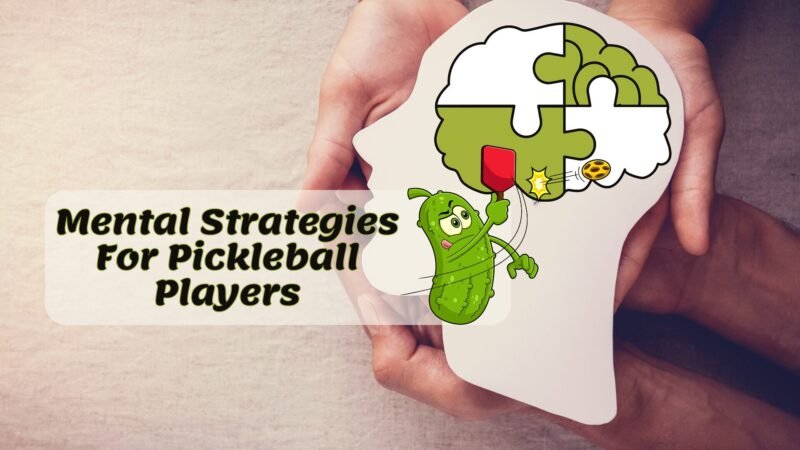

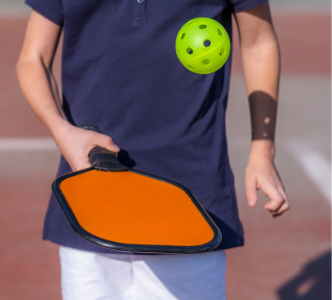
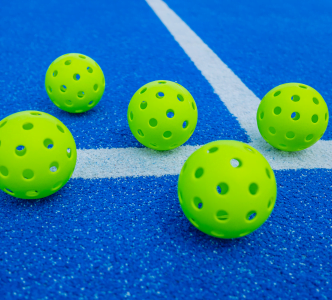

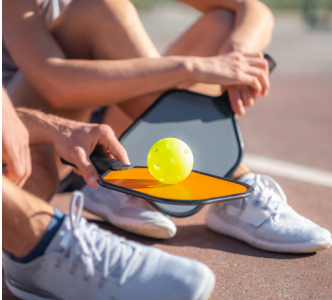
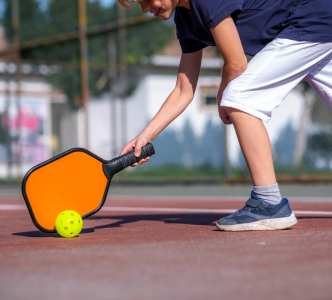
It is perfect time to make some plans for the future and it is time
to be happy. I have read this post and if I could I want to suggest you
few interesting things or tips. Perhaps you can write next
articles referring to this article. I want to read more things about it!
Hey Donna,
Thanks for your kind words. I would love to know about your suggestion.